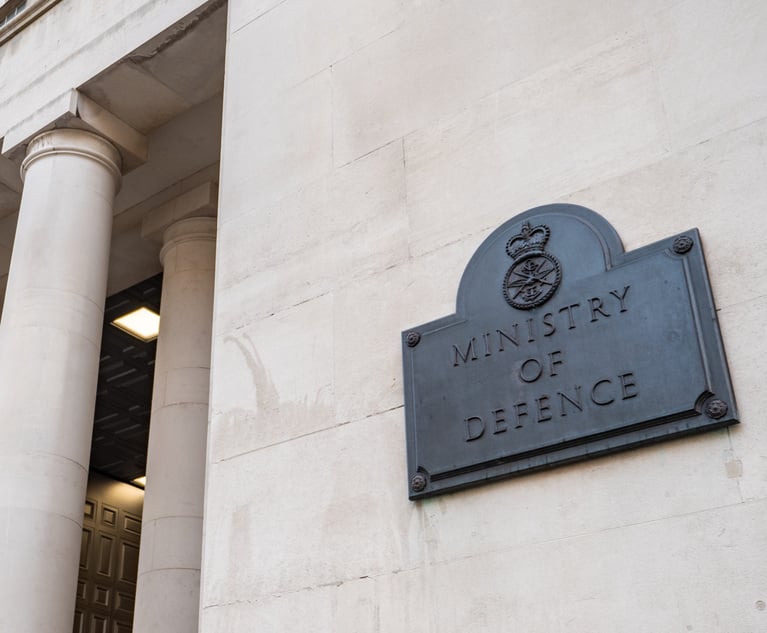The Most Helpful COVID-19 Advice, According to GCs
Firms should work together, providing more digestible bulletins and focus on contractual resilience, say heads of legal.
March 26, 2020 at 08:55 AM
5 minute read
 Credit: Shutterstock
Credit: Shutterstock
Law firms should be providing more digestible coronavirus advice and should consider working together and channeling efforts into pro-bono initiatives during such turbulent times, U.K. general counsel believe.
The COVID-19 global pandemic has seen law firms rush to produce bulletins, webinars and taskforces. But speaking to Law.com International's U.K. arm, Legal Week, Sam Ross, general counsel at ComplyAdvantage, said there is almost no time to read the detailed bulletins being published by law firms. He thinks that a more digestible format would be beneficial for users.
"Different times warrant different thinking."
"Perhaps the bulletins could be done as podcasts" he suggests. "Or having things on one page rather than too long. Law firms should keep it simple."
Pointing to how supermarkets are now working together against the backdrop of relaxed competition laws, Ross also thinks law firms could "work together rather than having 12 separate bulletins", as "different times warrant different thinking". He adds that it would be useful for firms to "band together" and decide who will provide which updates.
Ross also said that another missing offering is free template documents, such as standard documents to deal with common issues. While these would be "incredibly useful", he suggests this is something that GCs and law firms can work together on.
"What GCs need in a crisis is not generic marketing but trusted adviser relationships which help their businesses make decisions that are often not about the law but about doing the right thing for that business and its stakeholders."
For Edward Walker, former interim general counsel at Vivo Energy, the coronavirus is being used as "an opportunity to market" on social media. He highlighted the example of the numerous law firm posts on LinkedIn advertising their COVID-19 specific services.
He said "that what GCs need in a crisis is not generic marketing but trusted adviser relationships which help their businesses make decisions that are often not about the law but about doing the right thing for that business and its stakeholders".
He added it can be difficult to hear sensible advice from trusted advisers amid all the generic marketing noise.
"GCs don't need to know detailed law, they need someone to spar with about what the right thing to do is. It's about deeper values", he continued.
But law firms should not limit themselves to solely advising clients and should set newer, refreshed targets based on less insular thinking.
ComplyAdvantage's Sam Ross added he would like to see law firms doubling down on pro bono efforts. "For example, a free webinar for self-employed people would be really impressive."
"If law firms do have less work, they should use their time to of course look after their family and friends, but also to use their legal skills to help the most vulnerable".
One head of legal in the construction sector said that the "speed and multi-faceted nature of this crisis will test business' major incident response plans and disaster management capability". As such, short-term legal responses will include "analysing the macro picture by mapping contractual terms onto an economic prediction" while a medium term issue will be triaging issues with customers and suppliers.
The head of legal predicts "a lot of litigation about contractual interpretation and the like", and would ask firms to "be at the forefront of this to understand contractual resilience against pandemics". "In time, many businesses will probably need a bail out and there will no doubt be tricky legal issues in all that", they said.
Because the situation is so extreme, will GCs really spend £20,000 on a law firm? Or will they just pick up the phone to the person on the other side of the contract to come up with a solution?
Another general counsel of a fintech business questioned whether there is necessarily a huge opportunity for law firms. "There's the obvious advice they can give on force majeure", they say. "But because the situation is so extreme, will GCs really spend £20,000 on a law firm? Or will they just pick up the phone to the person on the other side of the contract to come up with a solution?"
"Trust is a big part here", they add. "So if law firms do advise on contracts and their terms, it should be practical advice first".
Read More:
Magic Circle Duo Act as UK Government Offers Businesses COVID-19 Financial Relief
Big Four Legal Arm Head Says COVID-19 Will Change the Way Law is Practiced
NOT FOR REPRINT
© 2025 ALM Global, LLC, All Rights Reserved. Request academic re-use from www.copyright.com. All other uses, submit a request to [email protected]. For more information visit Asset & Logo Licensing.
You Might Like
View All
Hogan Lovells and Burges Salmon Secure Lead Roles in Largest Ever UK Defence Ministry Contract
2 minute read
Latham, Cleary, Clifford Chance Help Middle East Sovereign Wealth Funds Monetise Assets
3 minute read
‘The US Market Is Critical’: KPMG’s Former Head of Global Legal Services On the Big Four Firm’s Legal Arm Entering the US
6 minute readTrending Stories
- 1OCR Issues 'Dear Colleagues' Letter Regarding AI in Medicine
- 2Corporate Litigator Joins BakerHostetler From Fish & Richardson
- 3E-Discovery Provider Casepoint Merges With Government Software Company OPEXUS
- 4How I Made Partner: 'Focus on Being the Best Advocate for Clients,' Says Lauren Reichardt of Cooley
- 5People in the News—Jan. 27, 2025—Barley Snyder
Who Got The Work
J. Brugh Lower of Gibbons has entered an appearance for industrial equipment supplier Devco Corporation in a pending trademark infringement lawsuit. The suit, accusing the defendant of selling knock-off Graco products, was filed Dec. 18 in New Jersey District Court by Rivkin Radler on behalf of Graco Inc. and Graco Minnesota. The case, assigned to U.S. District Judge Zahid N. Quraishi, is 3:24-cv-11294, Graco Inc. et al v. Devco Corporation.
Who Got The Work
Rebecca Maller-Stein and Kent A. Yalowitz of Arnold & Porter Kaye Scholer have entered their appearances for Hanaco Venture Capital and its executives, Lior Prosor and David Frankel, in a pending securities lawsuit. The action, filed on Dec. 24 in New York Southern District Court by Zell, Aron & Co. on behalf of Goldeneye Advisors, accuses the defendants of negligently and fraudulently managing the plaintiff's $1 million investment. The case, assigned to U.S. District Judge Vernon S. Broderick, is 1:24-cv-09918, Goldeneye Advisors, LLC v. Hanaco Venture Capital, Ltd. et al.
Who Got The Work
Attorneys from A&O Shearman has stepped in as defense counsel for Toronto-Dominion Bank and other defendants in a pending securities class action. The suit, filed Dec. 11 in New York Southern District Court by Bleichmar Fonti & Auld, accuses the defendants of concealing the bank's 'pervasive' deficiencies in regards to its compliance with the Bank Secrecy Act and the quality of its anti-money laundering controls. The case, assigned to U.S. District Judge Arun Subramanian, is 1:24-cv-09445, Gonzalez v. The Toronto-Dominion Bank et al.
Who Got The Work
Crown Castle International, a Pennsylvania company providing shared communications infrastructure, has turned to Luke D. Wolf of Gordon Rees Scully Mansukhani to fend off a pending breach-of-contract lawsuit. The court action, filed Nov. 25 in Michigan Eastern District Court by Hooper Hathaway PC on behalf of The Town Residences LLC, accuses Crown Castle of failing to transfer approximately $30,000 in utility payments from T-Mobile in breach of a roof-top lease and assignment agreement. The case, assigned to U.S. District Judge Susan K. Declercq, is 2:24-cv-13131, The Town Residences LLC v. T-Mobile US, Inc. et al.
Who Got The Work
Wilfred P. Coronato and Daniel M. Schwartz of McCarter & English have stepped in as defense counsel to Electrolux Home Products Inc. in a pending product liability lawsuit. The court action, filed Nov. 26 in New York Eastern District Court by Poulos Lopiccolo PC and Nagel Rice LLP on behalf of David Stern, alleges that the defendant's refrigerators’ drawers and shelving repeatedly break and fall apart within months after purchase. The case, assigned to U.S. District Judge Joan M. Azrack, is 2:24-cv-08204, Stern v. Electrolux Home Products, Inc.
Featured Firms
Law Offices of Gary Martin Hays & Associates, P.C.
(470) 294-1674
Law Offices of Mark E. Salomone
(857) 444-6468
Smith & Hassler
(713) 739-1250









